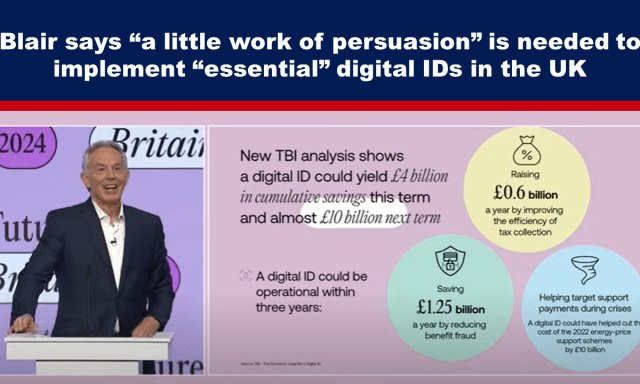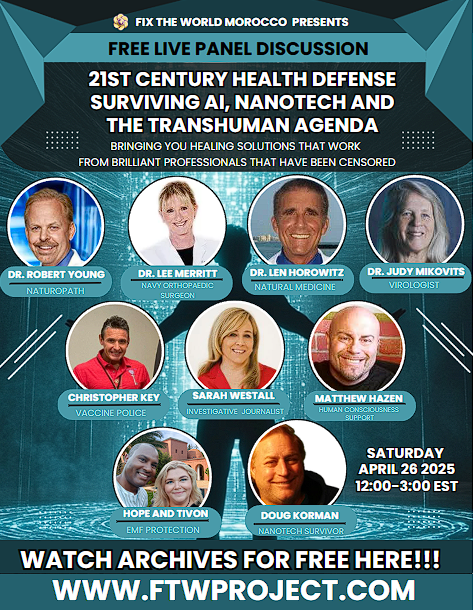War criminal, long-time member of the socialist Fabian Society and former UK prime minister Tony Blair says that digital ID is essential to modern digital infrastructure but requires “a little work of persuasion.”
Opening the 2024 Future of Britain Conference ‘Governing in the Age of AI’ last week, Blair shared the Tony Blair Institute for Global Change’s (“TBI’s”) vision for a reimagined state. He took the opportunity to continue his years-long push for the adoption of digital IDs.
“Digital ID is an essential part of a modern digital infrastructure,” Blair told the conference. “Though we have a little work of persuasion to do here, it has to be said,” he said laughing.
9 July 2024 (20 mins)
Tony Blair Institute for Global Change (“TBI”)
TBI is led by Blair, who serves as the owner and executive chairman. In 2017, Blair decided to close all his commercial and philanthropic activities, including the Tony Blair Faith Foundation, the Tony Blair Sports Foundation, the Tony Blair Governance Initiative and Tony Blair Associates. In their place one organisation was created: the Tony Blair Institute for Global Change.
Blair launched TBI as a “new policy platform to refill the wide-open space in the middle of politics” aimed at combating a “frightening authoritarian populism” that Blair says is undermining the West’s belief in democracy. The organisation is not a political party, but it is heavily influenced by Blair’s ideology and personal style.
According to Wikipedia, Blair gave the reserves of his former business to provide the seed funding for his new Institute. In 2018, it was reported that Blair had signed a deal worth £9 million with the Saudi government to advise and support the Saudi Crown Prince’s modernisation programme.
A few months later, TBI’s financial accounts confirmed the Saudi payment and also showed contributions from the US State Department, the Canadian government, some African governments and the Victor Pinchuk Foundation, a charity set up by a Ukrainian billionaire.
According to its latest financial accounts, for 2022, the Institute had a staff of 514 people; its income for the year was £121 million and its expenses were £95 million. The table below is taken from TBI’s 2022 accounts and shows its partners, and donors and funding partners.
You will note the involvement of some of the usual suspects such as The Rockefeller Foundation, the Bill & Melinda Gates Foundation and UN agencies. There are also other interesting partners and donors such as the Anti-Defamation League, the Muslim World League, the University of Oxford and Starlink.
| Our Partners Partnerships are at the heart of TBI’s strategy, and we have now established ourselves as a partnerships platform where we work with and through aligned partners and organisations to deliver meaningful change for our global network. We would like to thank the staff and leadership of every partner organisation for their thoughtful and collaborative work and support. Through all avenues of our work, TBI fostered both formal partnerships and informal initiatives through joint research, reports, convening, and programme development with a variety of stakeholders. Examples of partners we worked with in 2022: |
|
| The Africa Centres for Disease Control and Prevention (Africa CDC) | African Center for Economic Transformation (ACET) |
| The Anti-Defamation League (ADL) | African Population and Health Research Center (APHRC) |
| The Ellison Institute for Transformative Medicine | The Global Community Engagement and Resilience Fund (GCERF) |
| Institut Pasteur | Invest Africa |
| My Life My Say (MLMS) | Oracle |
| The Rockefeller Foundation | Stanford Healthcare Innovation Lab |
| Starlink | United Nations Development Programme (UNDP) |
| United Nations Economic Commission for Africa (UNECA) | University of Oxford |
| West African Health Organization (WAHO) | |
| Our Donors and Funding Partners Our donors and funding partners include philanthropists, foundations, governmental donors, corporates, and clients. Many have been supporting us since our inception, while others came on board this year. We thank them all. Examples of our donors and funding partners include: |
|
| The Aall Foundation | The African Development Bank Group (AfDB) |
| Alliance for a Green Revolution in Africa (AGRA) | Altai Consulting |
| The Anne Wojcicki Foundation | Asda |
| Bakrie Center Foundation | Bill & Melinda Gates Foundation |
| Blavatnik Family Foundation | Cross Boundary Advisory |
| Digital Impact Alliance | Foreign Commonwealth Development Of |
| International Fund for Agricultural Development | Joseph Rowntree Foundation |
| Katapult | The Kirsh Foundation |
| The Larry Ellison Foundation | Libra Philanthropies |
| Lloyds Banking Group | Medicom Healthpro Ltd |
| Motsepe Foundation | Muslim World League |
| The Rockefeller Foundation | United States Agency for International Development |
Annual report and Consolidated Financial Statements Year ended 31 December 2022, pgs. 8 and 9.
Currently, TBI has over 750 staff impacting more than 30 countries.
TBI is a member of UNESCO’s Global Education Coalition. Its member page states: “The Institute will provide online education solutions to help young people become global citizens, building empathy across boundaries and challenging misinformation, in a safe environment.” TBI also lobbies the European Commission on topics such as artificial intelligence, digital identification and Ukraine.
In February 2024, Sir Patrick Vallance – former Government Chief Scientific Adviser during covid and recently appointed UK Minister for Science – joined TBI’s “team of expert Strategic Counsellors,” alongside former Chief of the Defence Staff General Sir Nick Carter.
TBI’s Digital ID Wish List
On the same day as the Future of Britain Conference, TBI released a series of reports titled:
- Governing in the Age of AI: Reimagining the UK Department for Work and Pensions
- Prosperity Through Health: The Macroeconomic Case for Investing in Preventative Health Care in the UK
- The Economic Case for Reimagining the State
Chapter 3 section 3 of the ‘The Economic Care for Reimaging the State’ report relates specifically to digital ID. Within the digital ID section, it notes that released alongside the report was a “new TBI analysis” titled ‘The Economic Case for a UK Digital ID’. The analysis states:
A citizen’s digital ID would contain a single unique identifier, which would help link the user with public services. Each service would retain its own unique identifier such as an NHS number or Unique Taxpayer Reference.
The Economic Case for a UK Digital ID, Tony Blair Institute for Global Change, July 2024, pg. 8
As The Sociable noted, TBI’s report claims that digital ID can be used for everything from integrating “personal health records and personal data” to streamlining taxation and welfare payments, as well as for managing refugees and asylum seekers.

July 2024, pg. 7
The total cost of a digital ID rollout in the UK, according to the analysis, would cost at most £1.4 billion, and a digital ID scheme could be developed and deployed “over the course of a single parliamentary term (five years).”

July 2024, pg. 7
Digital identity is one of three major components of what is known as digital public infrastructure (“DPI”), which also includes massive data exchanges and a fast digital payments system, which can include the use of a central bank digital currency (“CBDC”).
For those who are still unaware of the dangers of CBDCs, well-known researcher and filmmaker Richard Hall of Rich Planet TV produced the video below in October 2022 explaining the dangers of smart money, CBDCs and removing cash.
Source: https://expose-news.com/2024/07/14/blair-says-a-little-work-of-persuasion-is-needed/
Bitchute: https://www.bitchute.com/channel/YBM3rvf5ydDM/
Telegram: https://t.me/Hopegirl587
EMF Protection Products: www.ftwproject.com
QEG Clean Energy Academy: www.cleanenergyacademy.com
Forbidden Tech Book: www.forbiddentech.website













